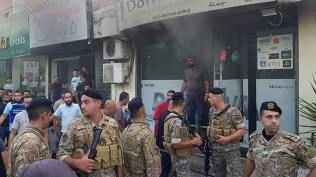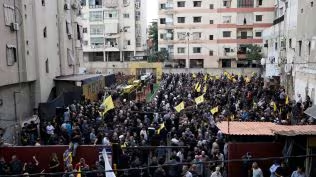After radio blasts, Israeli airstrikes target southern Lebanon
Israel conducted airstrikes in southern Lebanon on Thursday , claiming to have thwarted an Iranian-led assassination plot, reported Reuters. This follows a series of recent explosions involving Hezbollah radios and booby-trapped pagers, escalating tensions between the two foes.
The sophisticated attacks on communications equipment used by the Iran-backed militant group Hezbollah have caused widespread panic in Lebanon, leading many residents to abandon their mobile phones. “This isn’t a small matter; it’s war. Who can even secure their phone now? When I heard about what happened yesterday, I left my phone on my motorcycle and walked away,” said Mustafa Sibal, a resident near central Beirut told news agency Reuters.

Reports from Lebanese state media indicated that the roar of Israeli jets breaking the sound barrier could be heard in Beirut—a sound that has become increasingly frequent in recent months. Israel confirmed that its warplanes struck villages in southern Lebanon overnight, with airstrikes near the border reportedly resuming shortly after midday.
On Wednesday, hand-held radios used by Hezbollah detonated across southern Lebanon, resulting in 20 fatalities—the deadliest day in the ongoing cross-border conflict since fighting erupted alongside the Gaza war last year. The day prior, hundreds of pagers, employed by Hezbollah to avoid mobile phone surveillance, exploded simultaneously, killing 12, including two children, and injuring nearly 3,000.
In a post on X, Lebanese Prime Minister Najib Mikati urged the United Nations Security Council to take a strong stance against Israel’s “aggression” and “technological war” against Lebanon. While Israel has not directly addressed the booby-trapped radios and pagers, multiple security sources indicate that the attacks were orchestrated by its spy agency, Mossad.
Israel claims its conflict with Hezbollah, similar to its war in Gaza against Hamas, is part of a broader regional confrontation with Iran, which supports both groups along with armed movements in Syria, Yemen, and Iraq.
On Thursday, Israeli security forces announced the arrest of an Israeli businessman last month after he attended at least two meetings in Iran, discussing plans to assassinate Prime Minister Benjamin Netanyahu, the defense minister, or the head of the Shin Bet spy agency. Last week, Shin Bet revealed an alleged plot by Hezbollah to assassinate former Defense Minister Moshe Ya’alon.
Israel has faced accusations of carrying out assassinations, including a blast in Tehran that killed a Hamas leader and another in a Beirut suburb that took the life of a senior Hezbollah commander within hours of each other in July.
Despite the recent escalation, a spokesperson for the U.N. peacekeeping mission in southern Lebanon stated that the situation along the border had “not changed much in terms of exchanges of fire between the parties.” Andrea Tenenti noted, “There was an intensification last week. This week it is more or less the same. There are still exchanges of fire. It is still worrying, still concerning, and the rhetoric is high.”
As tensions persist, Israel and Hezbollah have engaged in cross-border exchanges of fire, coinciding with Israel’s military operations in Gaza against Hamas, which launched an attack on Israel on October 7. Tens of thousands of people have been forced to flee the Israel-Lebanon border area on both sides. Netanyahu vowed on Wednesday to ensure that evacuated Israelis would be returned “securely to their homes.”
Shifting focus
The Israeli military reported that its overnight airstrikes targeted Hezbollah positions in Chihine, Tayibe, Blida, Meiss El Jabal, Aitaroun, and Kfarkela, as well as a Hezbollah weapons storage facility in Khiam. Israeli media suggested that several Israeli civilians had been injured by anti-tank missile fire from Lebanon, though there was no official confirmation.
On Wednesday, Israeli Defense Minister Yoav Gallant stated that the conflict was entering a new phase, with additional resources and military units being redeployed to the northern border. Israeli officials confirmed that forces being stationed there include the 98th Division, an elite unit comprising commandos and paratroopers who have been actively engaged in Gaza.
Following the October 7 attack by Hamas, Hezbollah launched missile barrages into Israel, resulting in a continuous exchange of fire that has not escalated into full-scale war. However, tens of thousands have been evacuated from both sides of the border, and there is growing pressure within Israel for the government to facilitate the return of evacuees to their homes.
Disclaimer: The copyright of this article belongs to the original author. Reposting this article is solely for the purpose of information dissemination and does not constitute any investment advice. If there is any infringement, please contact us immediately. We will make corrections or deletions as necessary. Thank you.





